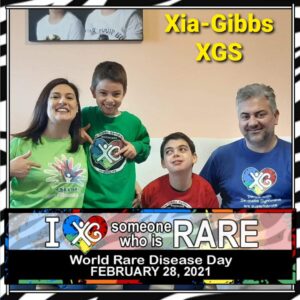Simone’s Story
By: Roberta, Parent of Simone, a 13 year old with an AHDC1 genetic change
“We participate in the research and we are spreading the information of the existence and importance of this study with other families in Italy and worldwide.”

What is your family like?
Our family consists of 4 people: Simone (13 yo Xia-Gibbs), Marco (9 yo), me (45 yo), Carlo (45 yo, father and husband). We are Italian.
What do you do for fun?
We all go on bike rides together; another thing that we enjoy a lot is singing and dancing.
Tell us about the biggest hardship you face.
Simone is not autonomous, he still wears the diaper day and night and is epileptic. He often gets frustrated because he wants to do things and gets violent with himself and others, bites, pulls hair, scratches and slaps himself on the head and punches. We are trying to decrease the behaviors / problems but it is not easy at all.
What motivates you to participate in research? How has participating in research been helpful for you?
Collecting data on a rare syndrome is very important because very little is still known and therefore reading and being able to deal with what happens to those who live in the same situations can help a lot psychologically but above all at the level of advice and activities to help the rare patients and those who surrounds him in everyday life.
How do you feel you are helping Simons Searchlight learn more about rare genetic changes?
We participate in the research and we are spreading the information of the existence and importance of this study with other families in Italy and worldwide.
What is one question you wish researchers could answer about this genetic change?
I would like to understand if with a possible genetic cure in the future, one can even think of improving mental retardation or it is impossible to have too many variants of the same gene that cause many more or less serious pathologies depending on the protein involved.
What have you learned about your or your child’s genetic condition from other families?
From March 2019, finally having a diagnosis, we were able to compare ourselves with other families and understand that what we had done up to that moment for Simone was the right path and that we must continue like this. We also discuss habits, such as coping with stereotypies or problem behaviors.
If you could give one piece of advice to someone recently diagnosed with this genetic change, what would it be?
To new families who contact me I always tell them to subject their children to examinations aimed at pathologies that are not yet evident in their family but that could be triggered at any moment such as epilepsy because it is part of the Xia-Gibbs framework. I also say to stimulate your children with a lot of speech therapy, psychomotor skills and swimming pool because they have severe generalized hypotonia that can only improve with exercise.
